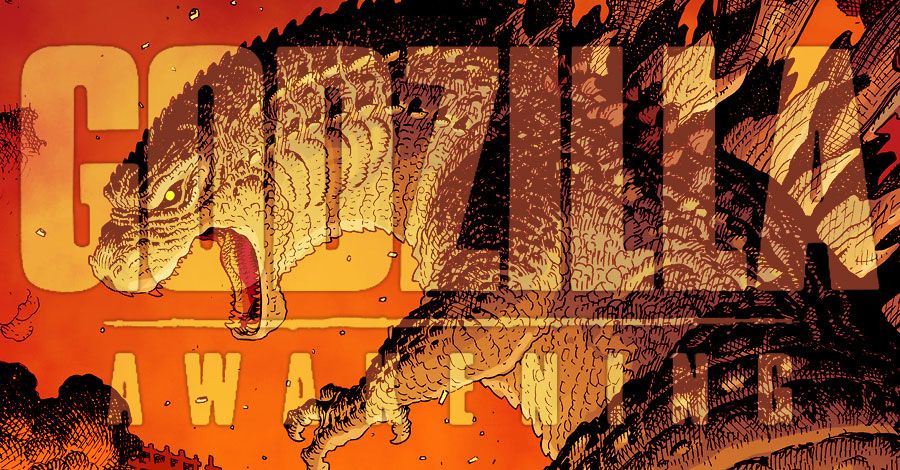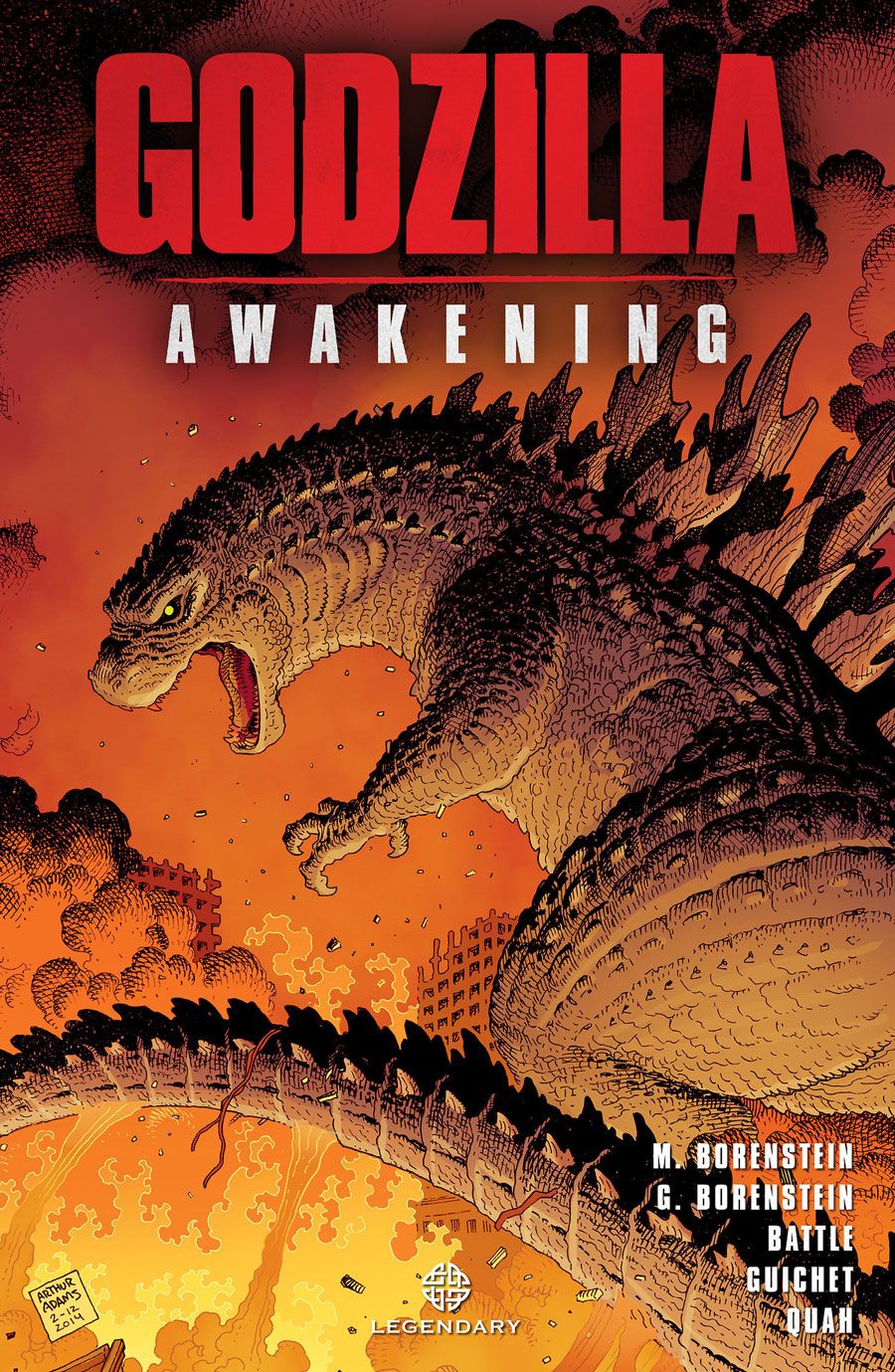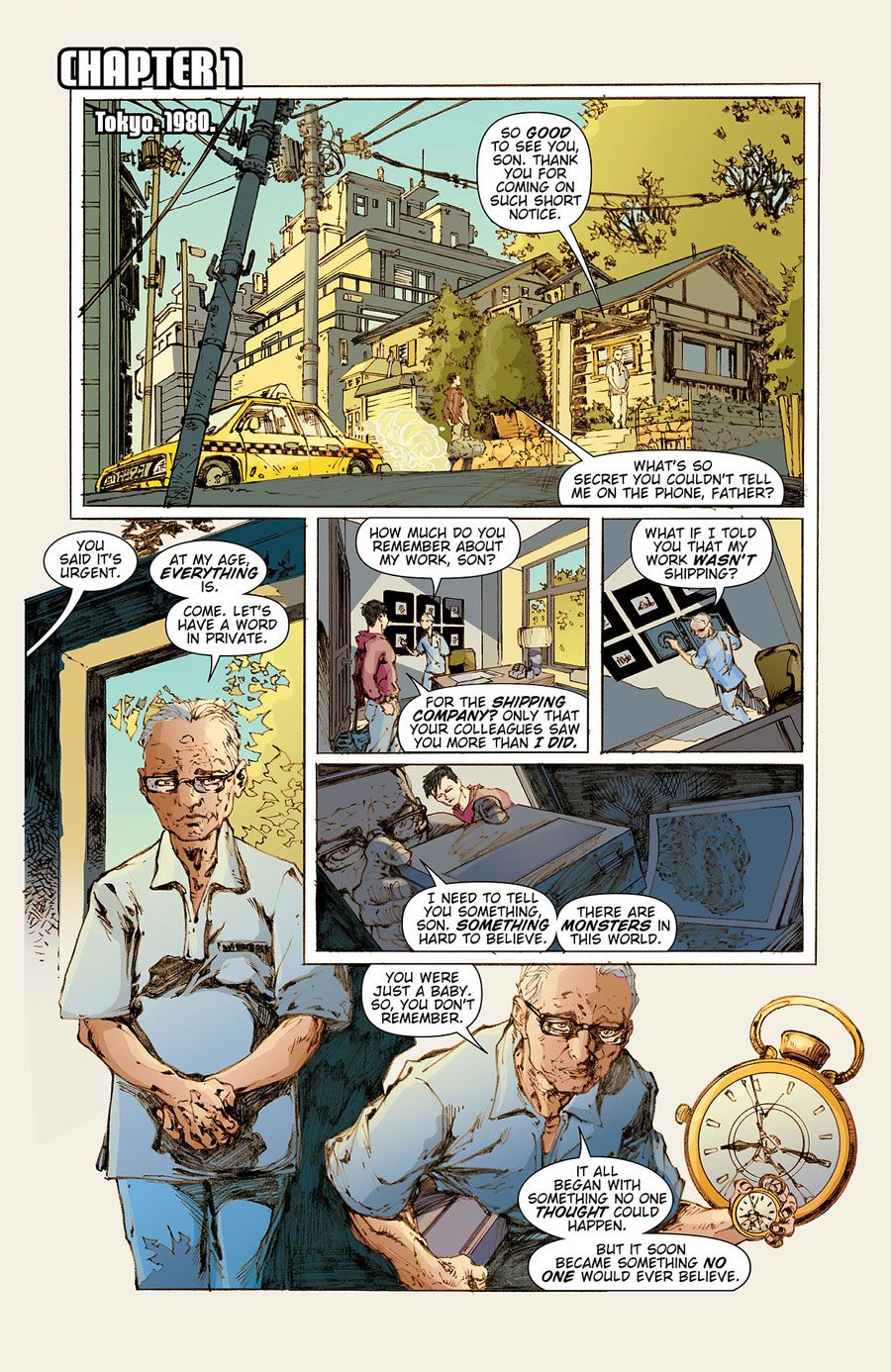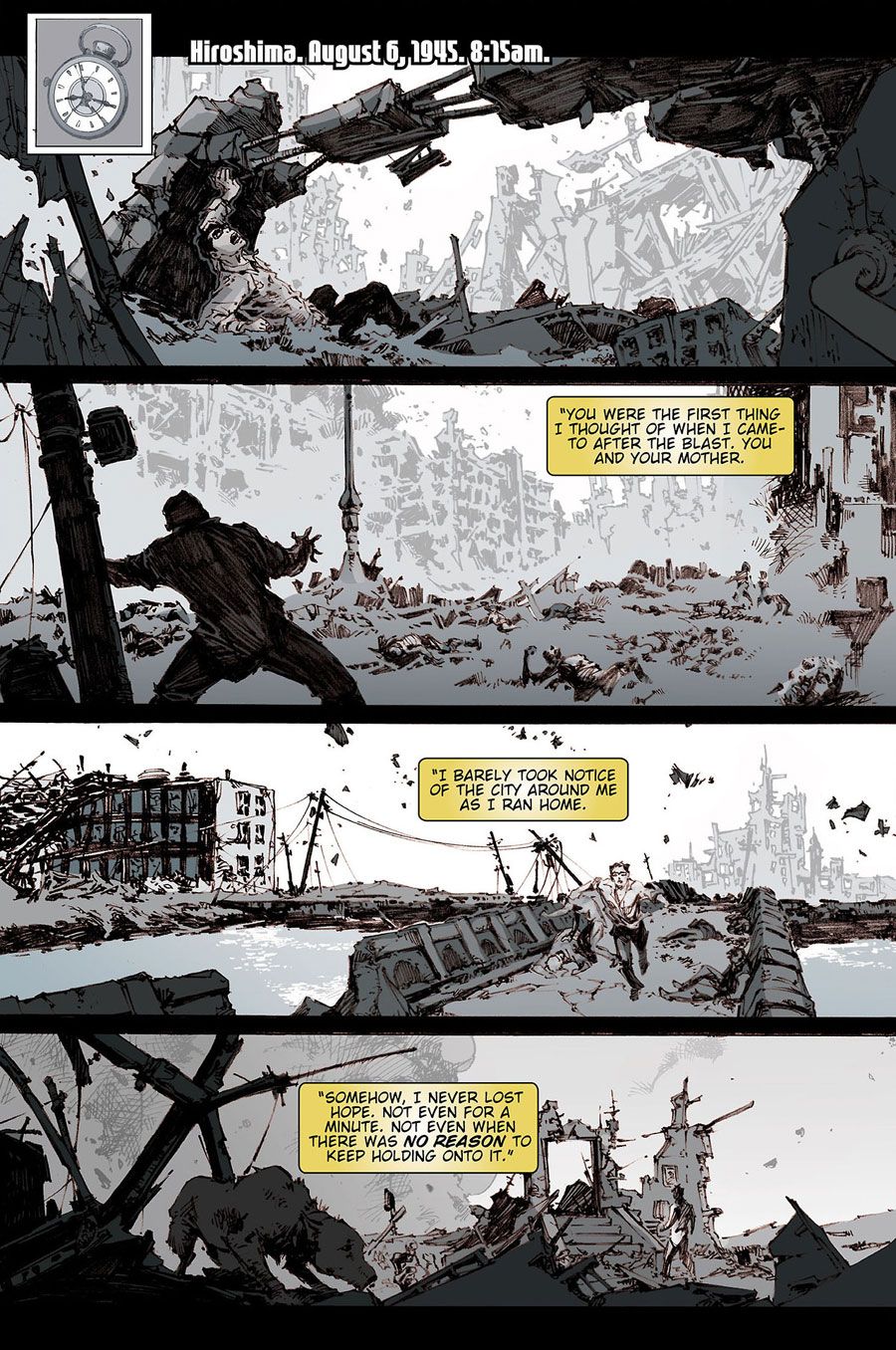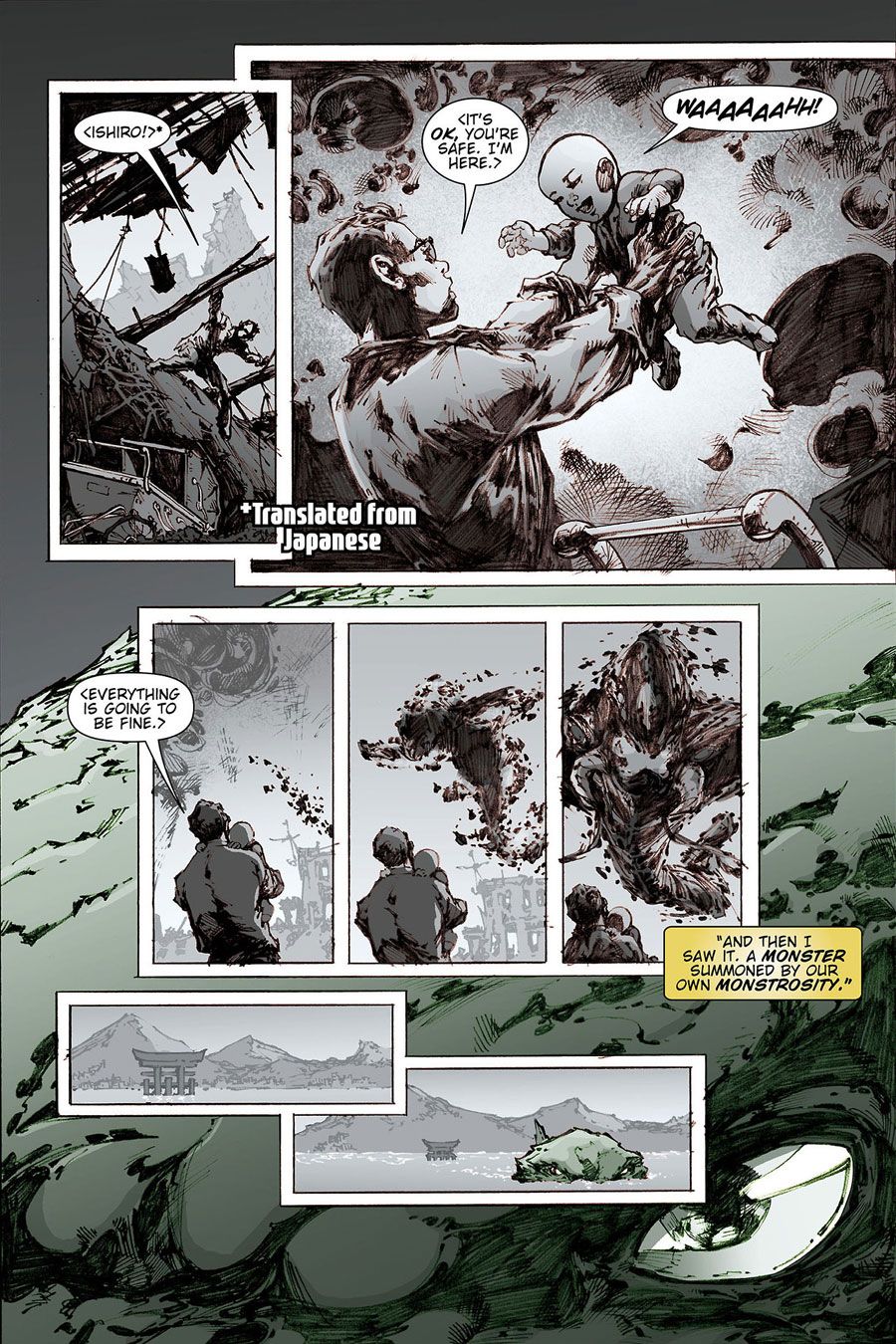"Godzilla" is a family film. Not a family-friendly film, necessarily, but a film about family all the same.
Directed by Gareth Evans for Legendary Pictures, "Godzilla" reimagines the King of the Monsters for a modern audience, though the creature's nuclear beginnings remain intact. The mixture of contemporary sensibilities and acknowledgement of the city-leveling creature's past owes much to screenwriter Max Borenstein, who views Godzilla as an allegory for traumatic natural disasters -- and for Borenstein, the way to explore the impact of those disasters is through the exploration of family dynamics.
Indeed, family isn't just a big part of Borenstein's "Godzilla" script, but his work on "Godzilla" behind-the-scenes as well. In addition to joining the Legendary family through his work on the film, Borenstein is also the co-writer of "Godzilla: Awakening," a prequel graphic novel that centers on one of the film's main characters, Doctor Ichiro Serizawa (played by Ken Watanabe), and his family's connection to Godzilla. Aided by artists Eric Battle, Yvel Guichet, Alan Quah and Lee Loughridge, Borenstein co-wrote the Legendary Comics original graphic novel with Greg Borenstein, Max's first cousin and lifelong friend.
RELATED: "Godzilla's" Gareth Edwards & Thomas Tull Hail the King of the Monsters
In an interview with Comic Book Resources, Borenstein spoke about the connective lines between his work on the "Godzilla" film and the "Godzilla" graphic novel, the theme of family in both stories, and the families that made his work possible.
CBR News: As the writer of "Godzilla" the movie, and as the co-writer of "Godzilla: Awakening," I'm curious to know what you saw as the connective tissue between the projects. Was it Godzilla the monster who, clearly, is a massive part of both stories? Was it Ichiro Serizawa and his father, and his family's history with Godzilla? Or was it something else?
Max Borenstein: I think the connecting point is both -- on a character-level, it's both Godzilla and the Serizawas. That really feeds into a thematic and tonal connection. Certainly, the graphic novel exists on the same timeline as the film. Not, obviously, as a direct prequel to act one, but as a tangent that feeds into it in some ways.
But the real connection for me was the idea of tying our film's Godzilla to its roots in the atomic age. In the thematic concerns of the first film and where this all comes from, showing the relationship between our film's thematic take on this character and the inception. The Serizawa family, those characters, are that link, really. They're the people who lived through that devastation of Hiroshima, which is of course the seed of Godzilla, if there is any. But now, they've lived to a day where that's a memory. But the thematic resonance of that -- that same tuning fork resonates at different frequencies today. That was the through line for us.
With that in mind, was Ichiro the character you started with when you began forming the plot for "Godzilla," or did another character help you get the ball rolling?
In the early days of the film, the character that I would say is the first sort of lynchpin, for me, when I started thinking about it then started talking to Gareth and the Legendary guys about it, was the Joe Brody character (Bryan Cranston) and the family that would surround him. It was the idea of someone who had experienced something that was a catastrophic event, the likes of which we've seen in this day and age on an all too frequent basis, whether it be Hurricane Katrina, or Fukushima, or whatever. Someone who experienced a natural disaster, or felt like one, and the family had suffered the consequences of that.
Somehow, our story could be a redemption story, and in a way, a resolution and churning up of the past to force these characters to literally face their demons, by literally facing giant monsters. That was the initial take.
What's interesting is, the comic gives you an opportunity to tell a similar type of story with Ichiro, played by Ken Watanabe in the film. You learn a little bit about Ichiro's father in the movie, but by and large, it's all here in the comic.
Absolutely. In the film, from the very early days, the Serizawa character was always a part of it. The idea that he had this pocket watch that belonged to his father, and his father lived through the events of the bomb at Hiroshima, was something that was always part of the script. Gareth and I both felt very attached to it because it tied our film into the "Godzilla" mythos and history. It made it real. It didn't shy away from the origins of Godzilla.
That was something that was always part of the film, but couldn't be explored in greater detail in the context of the film, because it was really a sort of moment of back-story and a thematic expansion. The moment Legendary approached me with the idea of potentially expanding our universe into a graphic novel, this is where my mind jumped, because I always loved that idea and thought it was a very interesting way of paying homage to the original while expanding our own take.
Family is clearly a big part of both of these stories --
The theme of family, given the challenges of what Godzilla is, and when you start to think about what is a compelling human drama that can take place in the context of a "Godzilla" story. He's so far beyond the scale of man, literally, that in order to conceive of his arrival, you have to hark back to natural disasters, as I was referring to. The stories that come out of those events are always stories about loved ones, family and friends, humans with connections to people at risk or are lost. Whatever it may be. Somehow having to survive, both physically and psychically, events like that.
Because of Godzilla's scale, the story can't be, "Some human wrangles Godzilla," or, "Someone falls in love with Godzilla." It can't be that story, so it has to be about people who are impacted by Godzilla. When people are impacted, it's families. There are connections. There are ties. It helps to expand the story into something that feels global and resonant and hopefully tugs at people's heartstrings. That's why family felt like such an important theme.
Staying with that theme, can you talk about the creative family surrounding "Godzilla" the film? Working with Gareth, working with the folks at Legendary, and the creative relationships you formed there?
Legendary, they are an incredible and very unique studio that really has a very tight knit and singular kind of vision. It comes from the top down, from the grand poobah Thomas Tull, who is a real fan and passionate advocate for the movies they make. They've never made a movie, and I don't think they'll ever make a movie or any product, that's just a cash grab. He chooses the movies they do and the other things they do based on his taste and passion. I think the integrity of that is just tremendous. I think it's the reason that fans come to their films.
The atmosphere at the company really takes a cue from that. It's very tight knit and familiar and familial in that sense, because people really are on the same page, trying to make products that they would love to see. There's something really exceptional about being involved in that. It's been a tremendously rewarding experience. Working on any big film, it's such a huge undertaking and there are so many people involved, that having a generalissimo like Thomas and, in the case of this film, Gareth, be able to bring everyone together in such a cohesive way with such a singular vision, it was really remarkable. That was something that was a truly rewarding experience to be a part of.
How about family as it relates to the graphic novel? It's not just a theme in the story, it's a big part of the creation of the book, since you co-wrote "Awakening" with your cousin, Greg. What was that experience like?
Greg and I are first cousins, but we grew up like brothers. We have a real short hand. We've been working in our spare times on developing a totally different graphic novel that we're still working on, something that we'll finish soon, hopefully. We work in very different fields, but we have a lot of similar interests. We're interested in the things the other is more expert in. In his case, he's a technologist at MIT and is really interested in all sorts of things, all of which are beyond my technical grasp, but they fascinate me, and we spend a lot of time talking and riffing about. I'm, obviously, in films and in that business. But we've been collaborating.
When the idea came up to do a comic book that would tie into the "Godzilla" franchise, I immediately called Greg and asked if he'd be interested in doing this together. We had developed a shorthand and embarked on the learning curve of writing comics together. He's a huge fan and avid follower of the current state of comic books in a way that's more in-depth than I could ever lay claim to. It was a really great opportunity to get together and tackle that.
And I guess it really is an extra little bell or whistle that I hadn't even picked up on, myself -- that the graphic novel happens to be about family, too.
If you could go back in time and hang out with young Max and Greg at one of your sleepovers, and tell them that you were going to be writing an official "Godzilla" comic, how would those kids react? Would they freak out?
Yeah, totally. We would have been constructing an elaborate fort with G.I. Joe figures and He-Man figures and Godzilla figures, and all sorts of shit. [Laughs] Honestly, that's how I started learning storytelling, even before reading or watching movies. It was that kind of play and telling these long, epic stories. You'd take a break, go outside, then come back and resume. It was the greatest.
"Godzilla" hits theaters on May 16. "Godzilla: Awakening" is on shelves now.

